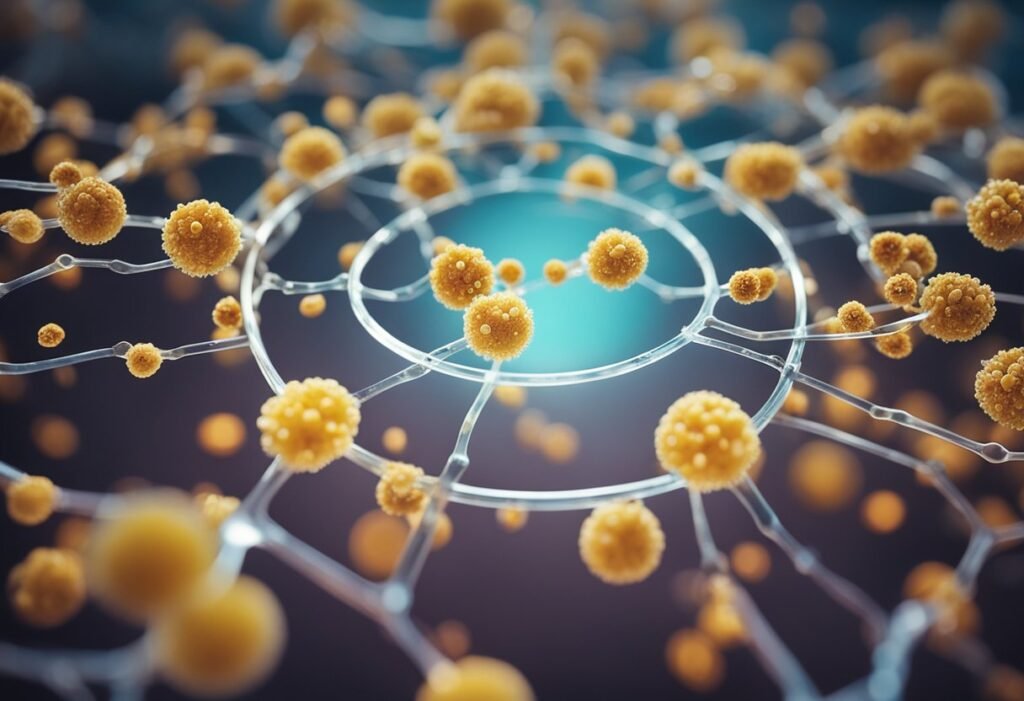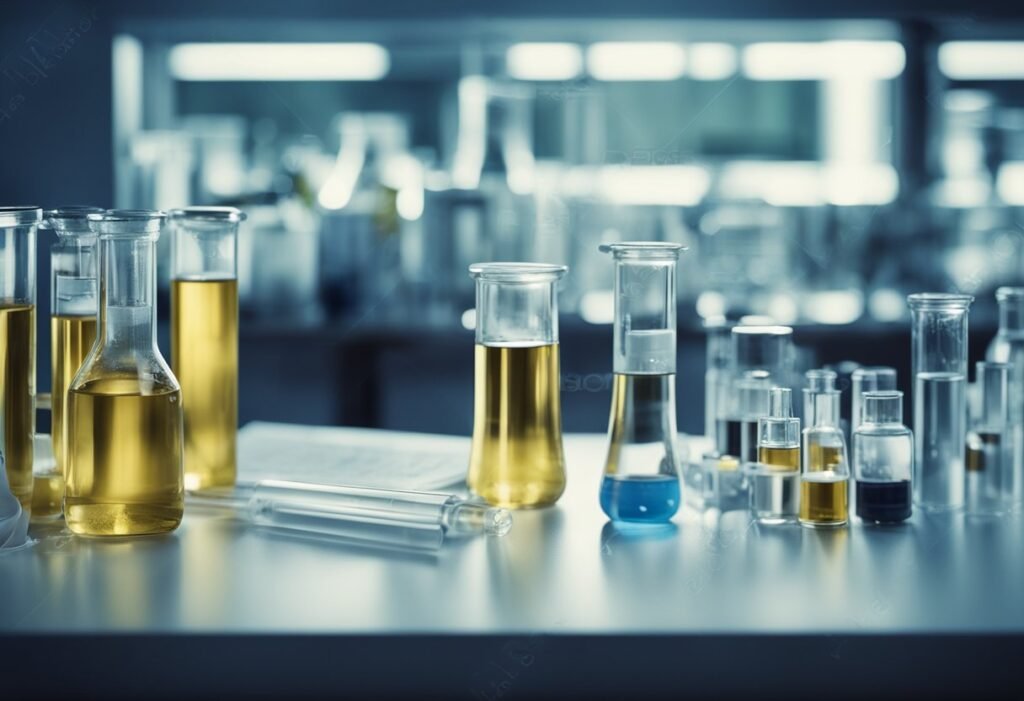Berberine is one of the natural compounds discovered in various plants including barberry to have various advantages when it comes to helping with acne. This supplement is also popular for its fold activity against inflammation and microbes, which are vital in eradicating acne at the source. According to this NIH clinical trial, Berberine has been shown to reduce acne by up to 45% in just four weeks, making it an attractive option for those struggling with persistent breakouts.
This shows that one of the ways through which berberine may be helpful in the case of acne is through moderating insulin levels. Hypersensitivity to insulin also contributes to acne, and when this is solved, the outlook for a person’s skin will be much brighter. Also, berberine has immunomodulatory effects which help reduce the secretion of inflammatory cytokines, thus, the inflammation related to acne.
Notably, berberine also influences hormonal regulation; thus, it is beneficial for women with PCOS, which is another major contributor to acne. Losing seb derm testosterone production in ovarian cells, berberine targets one of the hormonal dysfunctions that cause acne. So when continuing reading this topic, you will discover all the occasions that berberine can be useful in the fight against acne.
Understanding Acne and Berberine’s Role
Acne Vulgaris is a common skin condition among teenagers and adules. Some factors that contribute to acne vulgaris include bacteria and inflammation. Some compounds, especially berberin extracted from certain plants have positive attributes that could solve such issues.
The Pathophysiology of Acne
The common acne vulgaris occurs when sebaceous glands secrete more sebum resulting to pore blockage. These blockages are conducive for Propionibacterium acnes bacteria growth. Thus, it leads to inflammation, bacterial overgrowth, and formation of pimples, nodules, and cysts.
In addition, the hormone imbalance, most probably among the adolescents, tend to worsen the sebum secretion. With too much oil on the skin’s surface coupled with the dead skin cells, a blockage of the hair follicle is inevitable, paving the way for acne. Understanding these reducent causes makes it easier for one to understand how specific supplements such as berberine may be beneficial.
Berberine’s Antimicrobial and Anti-inflammatory Actions
Berberine acts as potent antimicrobial and anti-inflammatory agent. It can slow the proliferation of Propionibacterium acnes the bacteria associated with acne vulgaris hence minimizing infection and inflammation.
Furthermore, berberine intervention retarded pro-inflammatory cytokines and these are substances that encourage inflammation. Decreasing these cytokines can decrease inflammation in acne lesions The level of these cytokines should be brought down as this will help in the reduction of inflammation in acne lesions.
It is said that berberine can also affect the insulin level, so the sebum secretion can be regulated and skin health can be maintained. Although there are no direct mentions of the specific effects of berberine on sebum secretion, yet through regulation of insulin levels, it can help control sebum secretion which is another contributor to acne.
The Impact of Berberine on Hormones and Metabolism

Regarding the hormonal balance and metabolic effects, berberine has revealed positive effects. It affects a number of aspects including the insulin sensitivity and the levels of androgens that are so relevant in conditions such as PCOS and metabolic syndrome.
Regulation of Hormonal Balance
As for results, one must specify that berberine works with hormones, such as insulin and testosterone. The ingestion is said to improve the sensitivity of cells to insulin to execute the tasks that insulin is supposed to do. This is especially helpful for female riders who have PCOS, and most of them are marked with insulin resistance.
Further, it has hypoglycemic and hypolipidemic effects as well as decreases the androgen levels like testosterone common in women with PCOS. : Berberine thus has a potential in the management of such related symptoms like acne and excessive body hair growth that are associated with high androgen status. In our view, considering that berberine has an effect on insulin, something related to that can probably contribute to the influence on other hormones.
Berberine’s Effects on Metabolism
Metabolic processes are also affected by berberine. Its effectiveness in improving the body’s sensitivity to insulin contributes to better glycemic control especially for the individuals with metabolic syndrome or obesity.
Literatures suggested that berberine possesses the effect on lipid metabolism wherein it decreases serum triglyceride and cholesterol concentration. This can result in better heart health among the food consumers. Furthermore, for the population with metabolic abnormalities, it was possible to determine that berberine contributes to the enhancement of glucose tolerance and possesses anti-inflammatory properties.
In conclusion, due to berberine’s effects on both hormones and metabolism, it is a uniquely effective all natural supplement for illnesses carried out through hormonal issues as well as disorders of metabolism.
Berberine in Traditional and Herbal Medicine

This supplement has been a rather exciting component of most ancient folk medicine systems. It’s employed in numerous treatments more frequently in Chinese medicine and relies on alkaloid compounds.
Historical Use in Chinese Medicine
Berberine belongs to the isoquinoline alkaloids with an ancient track record of use in TCM that employs it to address numerous diseases. Usually used in TCM for its antimicrobial and anti-inflammatory effects, some of the plants rich in berberine are Coptis chinensis (goldthread) and Phellodendron amurense (Amur cork tree).
Each of these herbs has been used by the practitioners to manage conditions like gastro intestinal upsets, infections, and dermatological problems. Baicalin and berberine together were effective for acne because of their anti-inflammatory and antibacterial effects. It can therefore be seen that its use was not restricted to internal consumption; topical preparations involving the use of the substance in a paste form etc where used for topical use for skin complaints.
Berberine-Containing Plants and Remedies
Many plants used in oriental and Indian traditional systems of medicine contain the isoquinoline alkaloid berberine. Some of the examples are, barberry (Berberis vulgaris), goldenseal (Hydrastis canadensis), and Oregon grape (Mahonia aquifolium). These plants contain a characteristic of a group of chemicals referred to as alkaloids-berberine which has an impact on the therapeutic properties of these plants.
Despite that barberry has numerous therapeutic uses, its utilization is most known for its antimicrobial and beneficial effects of the gastrointestinal tract. Goldenseal was used by Native Americans as a remedy to skin problems and digestive complaints; Oregon grape root is used in treatment of skin diseases such as psoriasis and dermatitis.
These plants most commonly have processed their bark, roots and stems, to come up with their herbal remedies. These parts are then in a processed form of teas, tinctures and ointments that help cure ankle problems as well as other ailments like acne.
Elaborating on what is known with historical uses enhances comprehension about the role of berberine in herbal remedies. It enables us to understand how they can benefit in many ways, and value how the berberine-containing plants are used in traditional medicinal system.
Clinical Evidence and Safety Profile

Berberine has been evidenced to have benefit in the treatment of acne, given the literature and clinical studies analysis. Therefore, awareness of the available literature for the effectiveness and risk factors is crucial for decision-making.
Research Insights from Clinical Trials
Clinical trials reveal that the use of berberine can help manage| of acne. Reseach shows that Berberine has anti-inflammatory effects which reduces the severinty and occurrence of acne. A recent trials review has demonstrated efficacy: in relation to acne, participants have fewer lesions and better skin condition.
Also, a potency of berberine as the antibacterial agent is helpful for the regulation of the presence of acne-causing bacteria. Also, focusing on clinical studies, it was established that the patients benefited from the intervention while noting low levels of side effects. The compliance of these results speaks volumes and berberine remains one of the best remedies for dealing with acne.
Understanding Side Effects and Precautions
Nevertheless, it has been proposed that berberine have the potential to work and thus, it is important to look at possible side effects, precautions to be taken among other things. Some of the severe side effects include: The general body discomfort especially the stomach discomfort that manifests in diarrhea and constipation. These are, as a rule, morbid and temporary.
It is recommended that healthcare providers should advise the clients on the potential drug interactions. Berberine may have an impact on various prescriptions, it can either enhance or impair the effectiveness as well as safety of the medications. As a result, it is recommendable to seek the consultation of a healthcare provider before taking berberine.
Hence, based on the experiences of using berberine, it is necessary to watch out for any side effects and follow up with healthcare practitioners on the specific advice to be followed. This kind of balance is rather safe and effective in the management of acne.
Incorporating Berberine into an Acne-Fighting Regimen
The integration of berberine can be beneficial for people who want to enhance the skin’s condition and fight acne. In this section, the reader will find information on the necessary dietary habits and supplementation that will enhance the effects of berberine when used to treat acne.
Dietary and Lifestyle Considerations
Thus, using berberine for acne requires a balance with diet intake. This implies that the skin needs support in the form of antioxidants found in foods like berries and any green-leafed vegetable. One should avoid foods that cause insulin to rise as it leads to acne; these are foods with higher sugar content and processed foods.
Another factor is the issue of the intake of water a certain number of times in a given day or section, commonly referred to as hydration. To sum up one should note that, regular intake of water, for example, facilitates cleanse the body and skin. That is why, exploring the history of berberine’s application in different types of herbal remedies and its complementary relationships with a proper diet is proven to helpful.
And lastly, physical fitness is underlined to contribute to the general health of skin as well as people should engage in exercises frequently. Exercise helps in circulation of blood and supply of nutrients to the skin and thus serves to be helpful for the acne cure.
Supplementation Guidelines and Best Practices
Before incorporating the berberine supplements in our diet we need to discuss with our registered dietitian or pharmacist. They can help make suggestions for dosage and regulate to avoid cases of interaction with other medications.
Doses that have been typically used are between 500 mg – 1500 mg daily either as a single large dose or several split doses that are administered with meals to avoid the detrimental side effects on the stomach lining.
It is advised to monitor liver function while on berberine, especially if one is on the drug for a long time. Through routine examinations, it will be easy to observe any negative impacts on the liver function. Moreover, for the effective usage of berberine supplements, it is noteworthy to combine it with further skin healing boosters which could be creams and additionally the other nutrients as zinc or Omega-3 fatty acids.







2 thoughts on “Does Berberine HELP With Acne?”
Comments are closed.